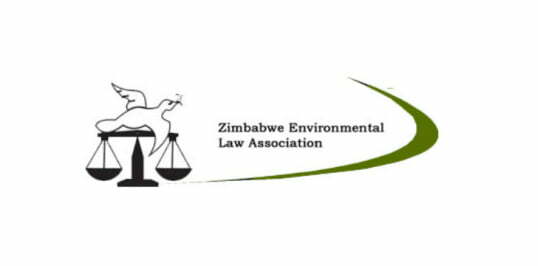The Zimbabwe Environmental Law Association (ZELA) condemns the shooting of two gold mine workers, Wendy Chikwaira and Kennedy Tachiona by their Chinese Mine employer at Reden Mine in Gweru on the 21st of June 2020.
Video, audio and picture images of the shooting incident were widely circulated on social media. A dispute allegedly occurred over outstanding wages and working conditions at Reden Mine. The mine owner is said to have shot the two at point-blank range after they demanded their outstanding wages. Both workers sustained injuries, with one shot on the chin while the other who was shot in the leg and thigh remains in hospital. ZELA understands that the Chinese mine owner and manager was arrested and is being charged with attempted murder. The Chinese embassy reportedly issued a statement in support of investigations by law enforcement agencies which they said should be done transparently and openly. They further indicated that he has no links with the Chinese Embassy and Government.
To us, this incident is part of a systematic and widespread pattern of labour rights violations by Chinese companies and investors in the extractive sector. In many parts of Africa, including Zimbabwe, Chinese mining investors have exhibited a history of bad safety, health, environmental, labour and human rights standards. Poor working conditions at Chinese companies are an old problem that is increasing. Mineworkers at Chinese mines often work in very dangerous, harsh and life-threatening environments. Despite the hard work and toil, the workers share little of the profits made by the mine owners in wages, social protection and other benefits. A 2012 study by South Africa Resource Watch which investigated Chinese labour practices in Zimbabwe, Zambia, and the Democratic Republic of Congo revealed that Chinese companies have engaged in widespread labour abuses and have subjected local employees in the mining industry to harsh and unfair working conditions. The report revealed that most Chinese mining firms exceed statutory working hours of eight hours a day, requiring employees to work 12 to 18 hours and that at the Makwiro platinum concessions workers do not receive overtime for 12 hours on the job. Low and measly wages, poor recruitment policies, discrimination, victimisation, sexual abuse, unfair dismissals and general Chinese hostility towards trade unionism among a litany of other poor working conditions punctuate most Chinese owned businesses. A study by ZELA in 2015 at Anjin Investments in Marange profiled such problems http://www.zela.org/…/no-strings-attached-the-plight-of-wo…/ .
From a safety and health perspective, many Chinese companies have appalling housing and sanitation facilities. Provision of Personal Protective Equipment (PPE) is often intermittent while medical check-ups for workers as prescribed by the law are erratic or non-existent. As a result, workers are often exposed to disease-causing environmental, safety and health elements such as noise, dust and hazardous chemicals and substances. Mine accidents are also commonplace. From an environmental perspective, many Chinese companies start operations without conducting Environmental Impact Assessments (EIA) to identify and address any potential negative environmental and social impacts of mining operations on communities and workers as required by the law.
In the advent of COVID-19, some of the egregious violations of workers’ rights at Chinese mines in Zimbabwe were exposed in a recent Mining Sector Situational Report produced by ZELA http://www.zela.org/…/covid-19-mining-sector-situational-r…/.
The report noted a great deal of workers’ safety and health concerns and exposure to contracting and spreading COVID-19 at the following Chinese owned mining companies; Anjin Diamond Mine in Marange, Zimberly Investment Hwange, Hwange Coal Gasification Company, South Mining, Sunrise Chilota Cooperation PVT LTD and Dingmao and Longrui among many others. The main safety and health concerns included lack of adequate personal protective equipment, poor accommodation and transport facilities that did not provide room for the practice of social distancing, limited access to adequate and safe water and other sanitation facilities such as toilets. Workers are provided with substandard gloves, masks, safety shoes and work suits.
Apart from the poor working conditions at Chinese mines, what is also of concern to ZELA is that, based on the history of Anjin in Marange, little or no attention seems to be paid by Government on payment of taxes, royalties and gold production levels and contribution to the fiscus. There are also well-documented cases of Chinese nationals arrested for smuggling gold and wildlife products. Returns submitted to the Zimbabwe Revenue Authority (ZIMRA) and the Ministry of Mines by Chinese small scale and large-scale mining entities should be closely scrutinised.
The shooting incident at Reden Mine and many other incidences of mine worker abuse, discrimination and ill-treatment may also be an indication of the need for Zimbabwe to rethink and reimagine its political and economic engagements with the Chinese. Over the years Zimbabwe and China signed many investment and loan agreements for cooperation in the mining, agriculture, infrastructure and communication sectors. The incident, therefore, raises political and economic questions. Have the labour laws of Zimbabwe been suspended by the Chinese? What is the role of politics in all this? Are the authorities lowering the standards for the Chinese without effecting any legal changes? How can productivity and efficiency be improved without abusing workers at the mine? The Chinese seem to be taking advantage of the political and economic ties between Zimbabwe and China and Zimbabwe’s desperation for Foreign Direct Investment (FDI) to commit criminal acts, disregard labour laws, partake in illegal mining activities, engage in leakages of minerals and illegal trade of minerals and other natural resources.
Recommendations
The incident at Reden Mine and the increasing entrance of Chinese investors into Zimbabwe, calls for the institution of several administrative, practical changes and steps by Government and other stakeholders including the following;
• Due process should be followed in dealing with the attempted murder case against the Chinese mine owner without fear or favour.
• Chinese mining and natural resource extraction companies and operations should be closely monitored for compliance with labour, environment, worker safety and health laws and standards. Enhanced and improved joint mine monitoring visits should be conducted by the Zimbabwe Miners Federation (ZMF), the Chamber of Mines, Mine Workers Unions, National Social Security Authority (NSSA), Ministry of Mines, Ministry of Environment , Tourism and Hospitality Industry Ministry of Labour and Social Welfare and Ministry of Health and other interested parties such as civil society groups.
• Chinese mining companies and other investors should be required by law to adopt and apply business and human rights and responsible sourcing standards in the mining sector. They should also be guided by the United Nations Guiding Principles on Business and Human Rights (UNGPs).This will enable them to identify and take measures to address all the risks associated with their operations including safety, health, environment, labour and community impacts of mining operations.
• The Government of Zimbabwe through the Human Rights Commission should consider assessing working conditions under Chinese owned enterprises in Zimbabwe.
• Government should institute a quick assessment of mineral production statistics, tax payments and mineral export receipts by Chinese gold mining companies, including a quick check on gold supplies to Fidelity Printers and Refineries. Public disclosure of such information will be key for promoting transparency and accountability.
• The Mine Workers Unions must increase visits and monitoring trips to mining areas where Chinese companies are operating from and work closely with community-based groups to monitor the living and working conditions of mine workers and impact on communities.
“Environmental justice through sustainable and equitable utilisation of natural resources and environmental protection”





